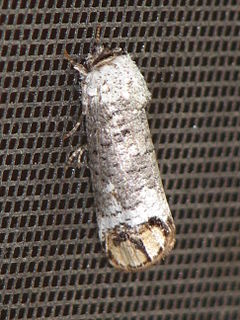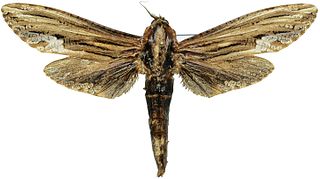| Vartiania zaratustra | |
|---|---|
| Scientific classification | |
| Kingdom: | |
| Phylum: | |
| Class: | |
| Order: | |
| Family: | |
| Genus: | |
| Species: | V. zaratustra |
| Binomial name | |
| Vartiania zaratustra Yakovlev, 2004 | |
Vartiania zaratustra is a moth in the family Cossidae. It is found in Iran, Iraq and Oman. [1]

Moths comprise a group of insects related to butterflies, belonging to the order Lepidoptera. Most lepidopterans are moths, and there are thought to be approximately 160,000 species of moth, many of which have yet to be described. Most species of moth are nocturnal, but there are also crepuscular and diurnal species.

The Cossidae, the cossid millers or carpenter millers, make up a family of mostly large miller moths. This family contains over 110 genera with almost 700 known species, and many more species await description. Carpenter millers are nocturnal Lepidoptera found worldwide, except the Southeast Asian subfamily Ratardinae, which is mostly active during the day.

Iran, also called Persia and officially known as the Islamic Republic of Iran, is a country in Western Asia. With over 81 million inhabitants, Iran is the world's 18th most populous country. Comprising a land area of 1,648,195 km2 (636,372 sq mi), it is the second largest country in the Middle East and the 17th largest in the world. Iran is bordered to the northwest by Armenia and the Republic of Azerbaijan, to the north by the Caspian Sea, to the northeast by Turkmenistan, to the east by Afghanistan and Pakistan, to the south by the Persian Gulf and the Gulf of Oman, and to the west by Turkey and Iraq. The country's central location in Eurasia and Western Asia, and its proximity to the Strait of Hormuz, give it geostrategic importance. Tehran is the country's capital and largest city, as well as its leading economic and cultural center.



